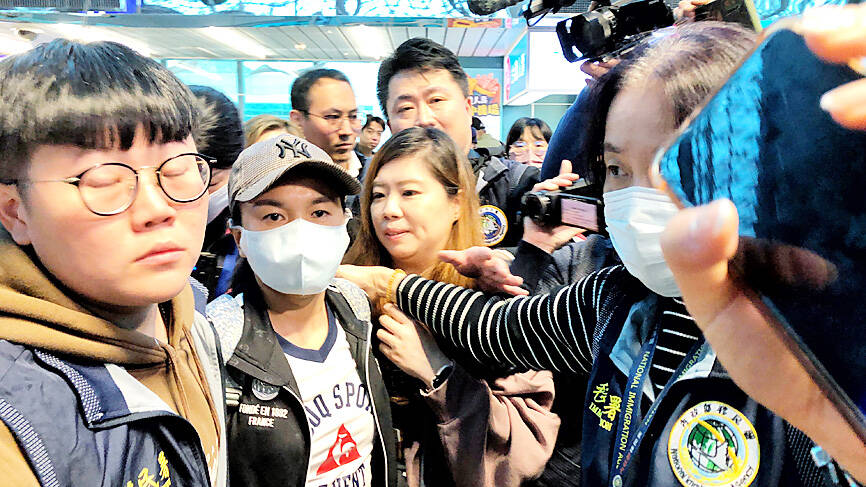A Chinese national whose dependent-based residency permit was revoked over social media posts that advocated China using military force to unite with Taiwan was forcibly deported yesterday after failing to leave the country before the deadline of her deportation order.
Known by her online pseudonym Xiaowei (小微) on the Chinese social media platform Douyin, the pro-China influencer boarded a flight to Guangzhou, China, at 2:10pm from Taiwan Taoyuan International Airport.
Xiaowei, whose marriage to a Taiwanese citizen provided the basis for her long-term residency in the country, reported to the National Immigration Agency (NIA) earlier yesterday.

Photo: CNA
Immigration agency personnel then escorted her to the airport.
“There’s nothing wrong with being a dignified Chinese citizen,” she shouted to reporters at the airport. “Taiwanese authorities are forcibly deporting me. Is it wrong to love my family and my country?”
The NIA has said that Xiaowei, whose given name is Zhao Chan (趙嬋), repeatedly advocated for China’s military takeover of Taiwan on Douyin, leading to the revocation of her residency permit.
The NIA, in a news release on March 21, said Xiaowei published several videos online, which included provocative remarks such as “The streets of Taiwan are filled with the five-star red flag,” referring to the flag of China.
The agency ordered her to leave Taiwan within a 10-day period. However, as she refused to comply, the authorities held a deportation review meeting yesterday morning and decided to forcibly remove her.
Mainland Affairs Council Minister Chiu Chui-cheng (邱垂正) said that while the government respects the NIA’s decisions, it urges the public to be more inclusive and supportive, particularly toward Chinese spouses and other new immigrants.
“The small number of Chinese spouses who have made inappropriate remarks should not affect other new immigrants who identify with and care for Taiwan,” he said.
Xiaowei’s deportation follows the recent cases of two other Chinese nationals, Enqi (恩綺), real name Zhang Yan (張燕), and Liu Zhenya (劉振亞), who goes by “Yaya in Taiwan” (亞亞在台灣), both of whom also lost their residency status last month for posting content advocating “military unification.”
Enqi left Taiwan on Monday, while Liu departed on Tuesday last week.
The NIA yesterday reiterated that it would take strong legal action against any foreign nationals who publicly advocate the invasion of Taiwan or elimination of its sovereignty.

MORE VISITORS: The Tourism Administration said that it is seeing positive prospects in its efforts to expand the tourism market in North America and Europe Taiwan has been ranked as the cheapest place in the world to travel to this year, based on a list recommended by NerdWallet. The San Francisco-based personal finance company said that Taiwan topped the list of 16 nations it chose for budget travelers because US tourists do not need visas and travelers can easily have a good meal for less than US$10. A bus ride in Taipei costs just under US$0.50, while subway rides start at US$0.60, the firm said, adding that public transportation in Taiwan is easy to navigate. The firm also called Taiwan a “food lover’s paradise,” citing inexpensive breakfast stalls

TRADE: A mandatory declaration of origin for manufactured goods bound for the US is to take effect on May 7 to block China from exploiting Taiwan’s trade channels All products manufactured in Taiwan and exported to the US must include a signed declaration of origin starting on May 7, the Bureau of Foreign Trade announced yesterday. US President Donald Trump on April 2 imposed a 32 percent tariff on imports from Taiwan, but one week later announced a 90-day pause on its implementation. However, a universal 10 percent tariff was immediately applied to most imports from around the world. On April 12, the Trump administration further exempted computers, smartphones and semiconductors from the new tariffs. In response, President William Lai’s (賴清德) administration has introduced a series of countermeasures to support affected

CROSS-STRAIT: The vast majority of Taiwanese support maintaining the ‘status quo,’ while concern is rising about Beijing’s influence operations More than eight out of 10 Taiwanese reject Beijing’s “one country, two systems” framework for cross-strait relations, according to a survey released by the Mainland Affairs Council (MAC) on Thursday. The MAC’s latest quarterly survey found that 84.4 percent of respondents opposed Beijing’s “one country, two systems” formula for handling cross-strait relations — a figure consistent with past polling. Over the past three years, opposition to the framework has remained high, ranging from a low of 83.6 percent in April 2023 to a peak of 89.6 percent in April last year. In the most recent poll, 82.5 percent also rejected China’s

PLUGGING HOLES: The amendments would bring the legislation in line with systems found in other countries such as Japan and the US, Legislator Chen Kuan-ting said Democratic Progressive Party (DPP) Legislator Chen Kuan-ting (陳冠廷) has proposed amending national security legislation amid a spate of espionage cases. Potential gaps in security vetting procedures for personnel with access to sensitive information prompted him to propose the amendments, which would introduce changes to Article 14 of the Classified National Security Information Protection Act (國家機密保護法), Chen said yesterday. The proposal, which aims to enhance interagency vetting procedures and reduce the risk of classified information leaks, would establish a comprehensive security clearance system in Taiwan, he said. The amendment would require character and loyalty checks for civil servants and intelligence personnel prior to